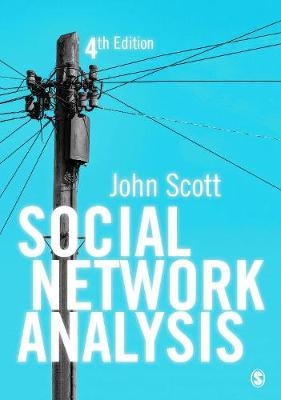
Social Network Analysis
SAGE Publications Ltd (Verlag)
978-1-4739-5211-9 (ISBN)
Incorporating the most important and cutting-edge developments in the field, this bestselling text introduces newcomers to the key theories and techniques of social network analysis and guides more experienced analysts in their own research.
New to This Edition:
A chapter on data collection, covering a crucial phase of the research process
Fully updated examples reiterate the continued importance of social network analysis in an increasingly interconnected world
Detailed ‘Further Reading’ sections help you explore the wider literature
Practical exercises including real-world examples of social networks enable you to apply your learning
Expanded and brought right up-to-date, this classic text remains the indispensable guide to social network analysis for students, lecturers and researchers throughout the social sciences.
John Scott is an Honorary Professor at the Universities of Essex, Exeter, and Copenhagen. He was formerly a professor of sociology at the Universities of Essex and Leicester, and pro-vice-chancellor for research at the University of Plymouth. He has been president of the British Sociological Association, Chair of the Sociology Section of the British Academy, and in 2013 was awarded the CBE for Services to Social Science. His work covers theoretical sociology, the history of sociology, elites and social stratification, and social network analysis. His most recent books include British Social Theory: Recovering Lost Traditions before 1950 (SAGE, 2018), Envisioning Sociology. Victor Branford, Patrick Geddes, and the Quest for Social Reconstruction (with Ray Bromley, SUNY Press, 2013), Objectivity and Subjectivity in Social Research (with Gayle Letherby and Malcolm Williams, SAGE, 2011).
What is Social Network Analysis?
The data used in social network analysis
Is there a network theory?
An overview
The History of Social Network Analysis
The sociogram and sociometry
Balance and group dynamics
Informal organization and community relations
Matrices and cliques
Formal models of community and kinship
Formal methods triumphant
Getting by without the help of your friends
Entry of the social physicists
Data Collection for Social Network Analysis
Asking questions
Making observations
Using documents
Boundaries in relational data
Positional and reputational approaches
Does sampling make sense?
Organizing and Analyzing Network Data
Matrices and relational data
Matrix conventions
An analysis of directorship data
Direction and value in relational data
Computer programs for social network analysis
Terminology for Network Analysis
The language of network analysis
More than joining up the lines
The flow of information and resources
Density of connections
Density in egonets
Problems in density measures
A digression on absolute density
Community structure and density
Popularity, Mediation and Exclusion
Local and overall
Mediation and betweenness
Centrality boosts centrality
Centralization and graph centres
The absolute centre of a graph
Bank centrality in corporate networks
Groups, Factions and Social Divisions
Identifying subgraphs
The components of a network
The strength and stability of components
Cycles and circuits
The contours of components
Cliques within components
Intersecting social circles
Components and citation circles
Structural Locations, Classes and Positions
The structural equivalence of points
Clusters and similarities
Divide and CONCOR
Divisions and equivalence
Regular equivalence in roles and functions
Corporate interlocks and participations
Social Change and Development
Structural change and unintended consequences
Small-world networks
Modelling social change
Testing explanations
Visualizing and Modelling
Taking space seriously
Using multidimensional scaling
Principal components and factors
Non-metric methods
How many dimensions?
Worth a thousand words?
Elites, communities and influence
Business elites and bank power
Notes
Bibliography
Index
| Erscheinungsdatum | 10.05.2017 |
|---|---|
| Verlagsort | London |
| Sprache | englisch |
| Maße | 170 x 242 mm |
| Gewicht | 560 g |
| Themenwelt | Sozialwissenschaften ► Soziologie ► Empirische Sozialforschung |
| ISBN-10 | 1-4739-5211-5 / 1473952115 |
| ISBN-13 | 978-1-4739-5211-9 / 9781473952119 |
| Zustand | Neuware |
| Haben Sie eine Frage zum Produkt? |
aus dem Bereich


